Ethics and Governance: Analysis of Royal Commission Report in Finance
VerifiedAdded on 2022/12/14
|11
|3399
|214
Report
AI Summary
This report provides an in-depth analysis of ethics and governance within the Australian financial sector, primarily focusing on the findings and recommendations of the Royal Commission. The executive summary highlights key issues such as unethical accounting practices, the prioritization of profit over customer satisfaction, malpractices in rewarding procedures, and the imbalance of information and power between customers and financial entities. The report delves into the application of deontology theory to understand the ethical failures identified in the financial service industry, including the misuse of market freedom, inadequate customer service, and the conflict of interest. The report also examines the standards and principles set by the Royal Commissioner to streamline the industry and reduce unethical practices, emphasizing the importance of acting reasonably, obeying the law, and providing fair services to all customers. Furthermore, the report addresses the ethical responsibilities of Australian CPA members, referencing APES 110 to evaluate unethical sales tactics. The report concludes by considering the importance of leadership and compliance with the law in fostering ethical conduct within the financial sector.
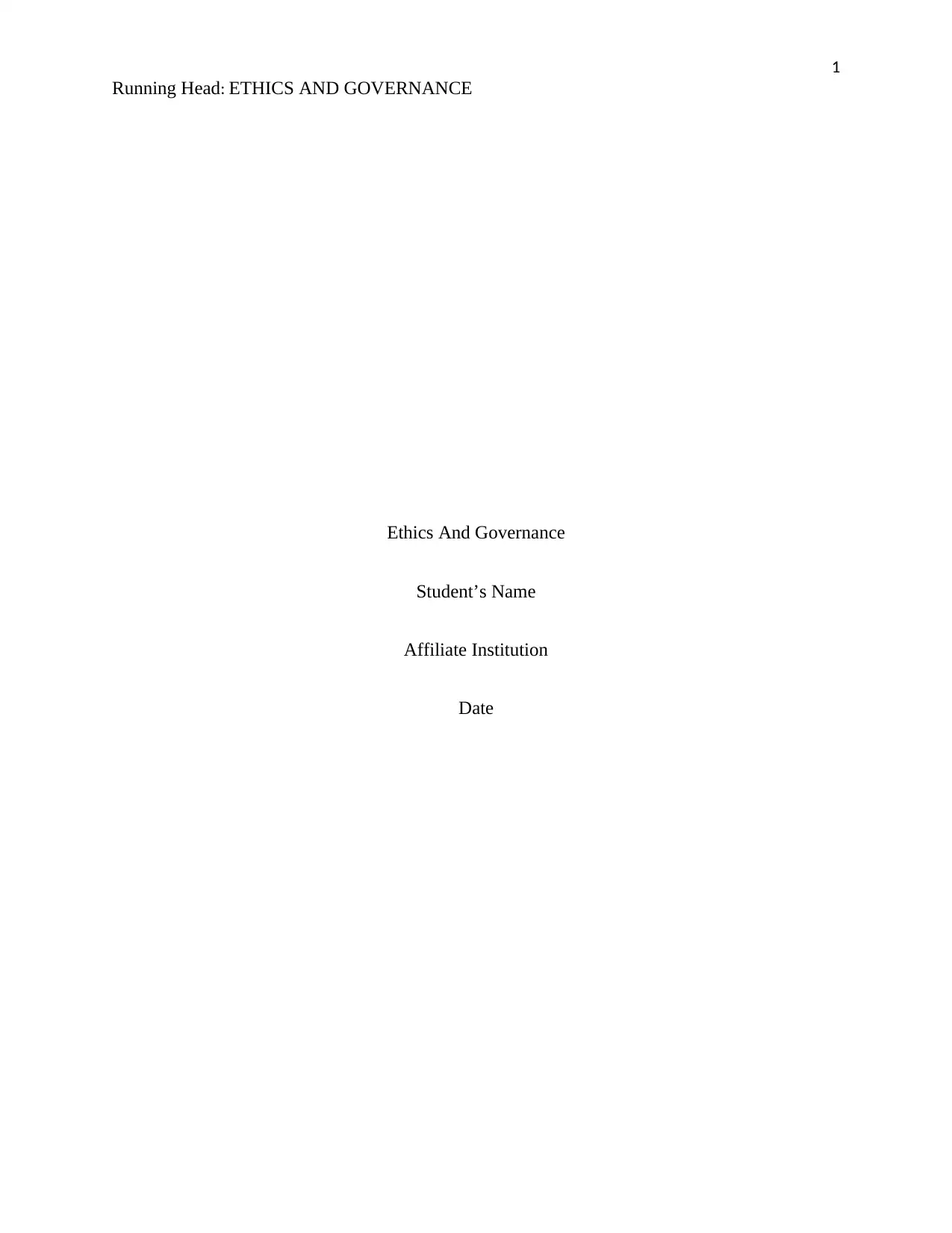
1
Running Head: ETHICS AND GOVERNANCE
Ethics And Governance
Student’s Name
Affiliate Institution
Date
Running Head: ETHICS AND GOVERNANCE
Ethics And Governance
Student’s Name
Affiliate Institution
Date
Paraphrase This Document
Need a fresh take? Get an instant paraphrase of this document with our AI Paraphraser
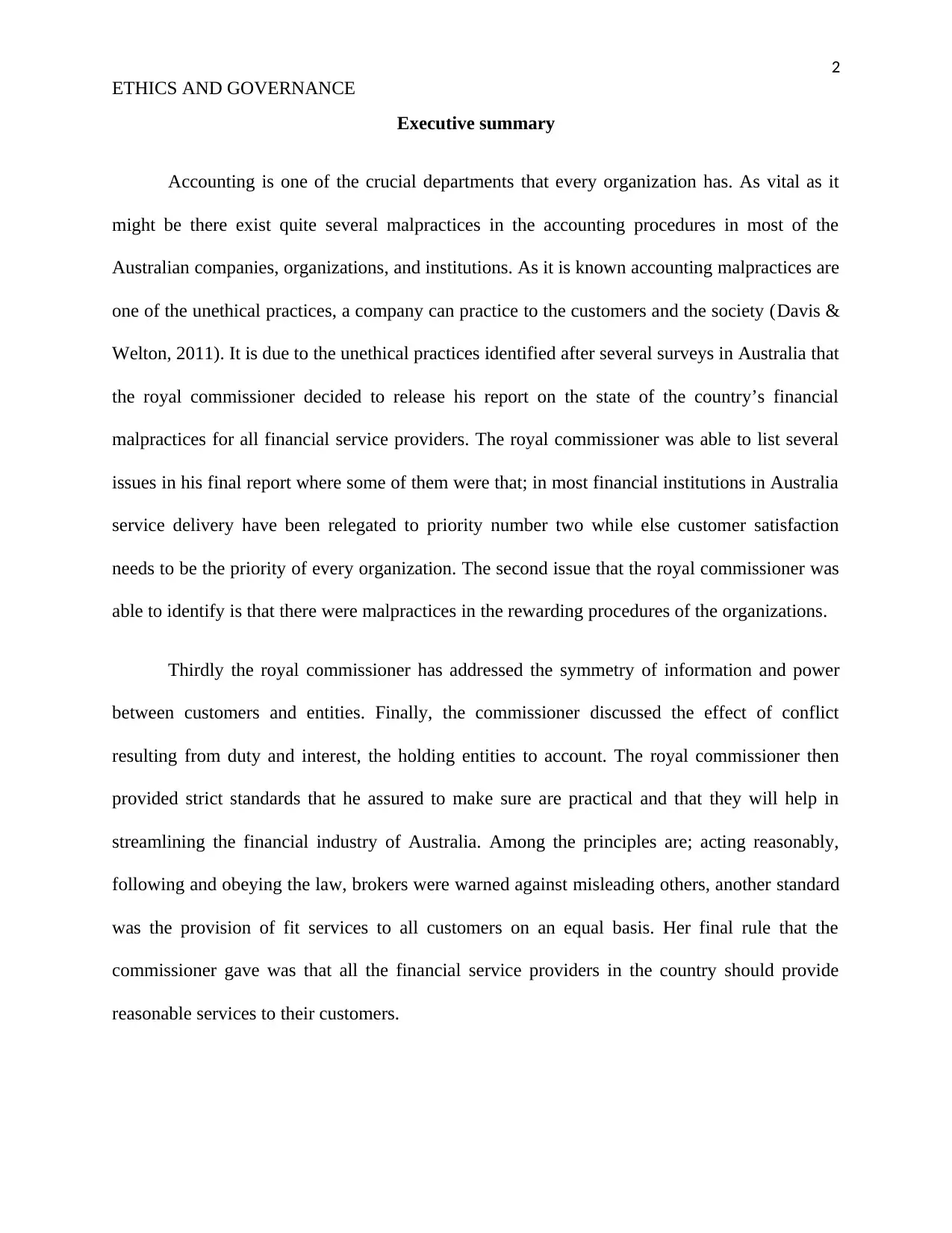
2
ETHICS AND GOVERNANCE
Executive summary
Accounting is one of the crucial departments that every organization has. As vital as it
might be there exist quite several malpractices in the accounting procedures in most of the
Australian companies, organizations, and institutions. As it is known accounting malpractices are
one of the unethical practices, a company can practice to the customers and the society (Davis &
Welton, 2011). It is due to the unethical practices identified after several surveys in Australia that
the royal commissioner decided to release his report on the state of the country’s financial
malpractices for all financial service providers. The royal commissioner was able to list several
issues in his final report where some of them were that; in most financial institutions in Australia
service delivery have been relegated to priority number two while else customer satisfaction
needs to be the priority of every organization. The second issue that the royal commissioner was
able to identify is that there were malpractices in the rewarding procedures of the organizations.
Thirdly the royal commissioner has addressed the symmetry of information and power
between customers and entities. Finally, the commissioner discussed the effect of conflict
resulting from duty and interest, the holding entities to account. The royal commissioner then
provided strict standards that he assured to make sure are practical and that they will help in
streamlining the financial industry of Australia. Among the principles are; acting reasonably,
following and obeying the law, brokers were warned against misleading others, another standard
was the provision of fit services to all customers on an equal basis. Her final rule that the
commissioner gave was that all the financial service providers in the country should provide
reasonable services to their customers.
ETHICS AND GOVERNANCE
Executive summary
Accounting is one of the crucial departments that every organization has. As vital as it
might be there exist quite several malpractices in the accounting procedures in most of the
Australian companies, organizations, and institutions. As it is known accounting malpractices are
one of the unethical practices, a company can practice to the customers and the society (Davis &
Welton, 2011). It is due to the unethical practices identified after several surveys in Australia that
the royal commissioner decided to release his report on the state of the country’s financial
malpractices for all financial service providers. The royal commissioner was able to list several
issues in his final report where some of them were that; in most financial institutions in Australia
service delivery have been relegated to priority number two while else customer satisfaction
needs to be the priority of every organization. The second issue that the royal commissioner was
able to identify is that there were malpractices in the rewarding procedures of the organizations.
Thirdly the royal commissioner has addressed the symmetry of information and power
between customers and entities. Finally, the commissioner discussed the effect of conflict
resulting from duty and interest, the holding entities to account. The royal commissioner then
provided strict standards that he assured to make sure are practical and that they will help in
streamlining the financial industry of Australia. Among the principles are; acting reasonably,
following and obeying the law, brokers were warned against misleading others, another standard
was the provision of fit services to all customers on an equal basis. Her final rule that the
commissioner gave was that all the financial service providers in the country should provide
reasonable services to their customers.
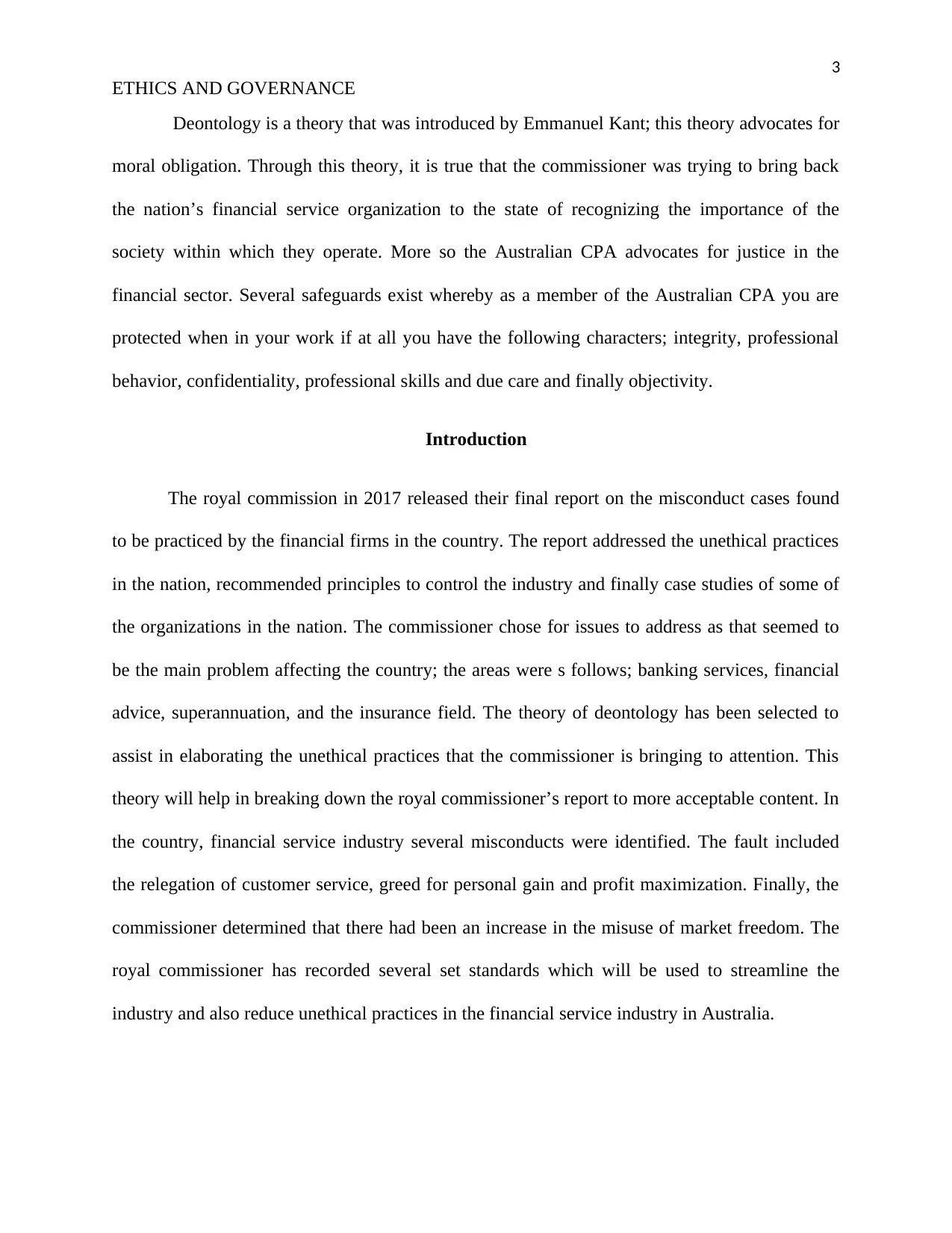
3
ETHICS AND GOVERNANCE
Deontology is a theory that was introduced by Emmanuel Kant; this theory advocates for
moral obligation. Through this theory, it is true that the commissioner was trying to bring back
the nation’s financial service organization to the state of recognizing the importance of the
society within which they operate. More so the Australian CPA advocates for justice in the
financial sector. Several safeguards exist whereby as a member of the Australian CPA you are
protected when in your work if at all you have the following characters; integrity, professional
behavior, confidentiality, professional skills and due care and finally objectivity.
Introduction
The royal commission in 2017 released their final report on the misconduct cases found
to be practiced by the financial firms in the country. The report addressed the unethical practices
in the nation, recommended principles to control the industry and finally case studies of some of
the organizations in the nation. The commissioner chose for issues to address as that seemed to
be the main problem affecting the country; the areas were s follows; banking services, financial
advice, superannuation, and the insurance field. The theory of deontology has been selected to
assist in elaborating the unethical practices that the commissioner is bringing to attention. This
theory will help in breaking down the royal commissioner’s report to more acceptable content. In
the country, financial service industry several misconducts were identified. The fault included
the relegation of customer service, greed for personal gain and profit maximization. Finally, the
commissioner determined that there had been an increase in the misuse of market freedom. The
royal commissioner has recorded several set standards which will be used to streamline the
industry and also reduce unethical practices in the financial service industry in Australia.
ETHICS AND GOVERNANCE
Deontology is a theory that was introduced by Emmanuel Kant; this theory advocates for
moral obligation. Through this theory, it is true that the commissioner was trying to bring back
the nation’s financial service organization to the state of recognizing the importance of the
society within which they operate. More so the Australian CPA advocates for justice in the
financial sector. Several safeguards exist whereby as a member of the Australian CPA you are
protected when in your work if at all you have the following characters; integrity, professional
behavior, confidentiality, professional skills and due care and finally objectivity.
Introduction
The royal commission in 2017 released their final report on the misconduct cases found
to be practiced by the financial firms in the country. The report addressed the unethical practices
in the nation, recommended principles to control the industry and finally case studies of some of
the organizations in the nation. The commissioner chose for issues to address as that seemed to
be the main problem affecting the country; the areas were s follows; banking services, financial
advice, superannuation, and the insurance field. The theory of deontology has been selected to
assist in elaborating the unethical practices that the commissioner is bringing to attention. This
theory will help in breaking down the royal commissioner’s report to more acceptable content. In
the country, financial service industry several misconducts were identified. The fault included
the relegation of customer service, greed for personal gain and profit maximization. Finally, the
commissioner determined that there had been an increase in the misuse of market freedom. The
royal commissioner has recorded several set standards which will be used to streamline the
industry and also reduce unethical practices in the financial service industry in Australia.
⊘ This is a preview!⊘
Do you want full access?
Subscribe today to unlock all pages.

Trusted by 1+ million students worldwide
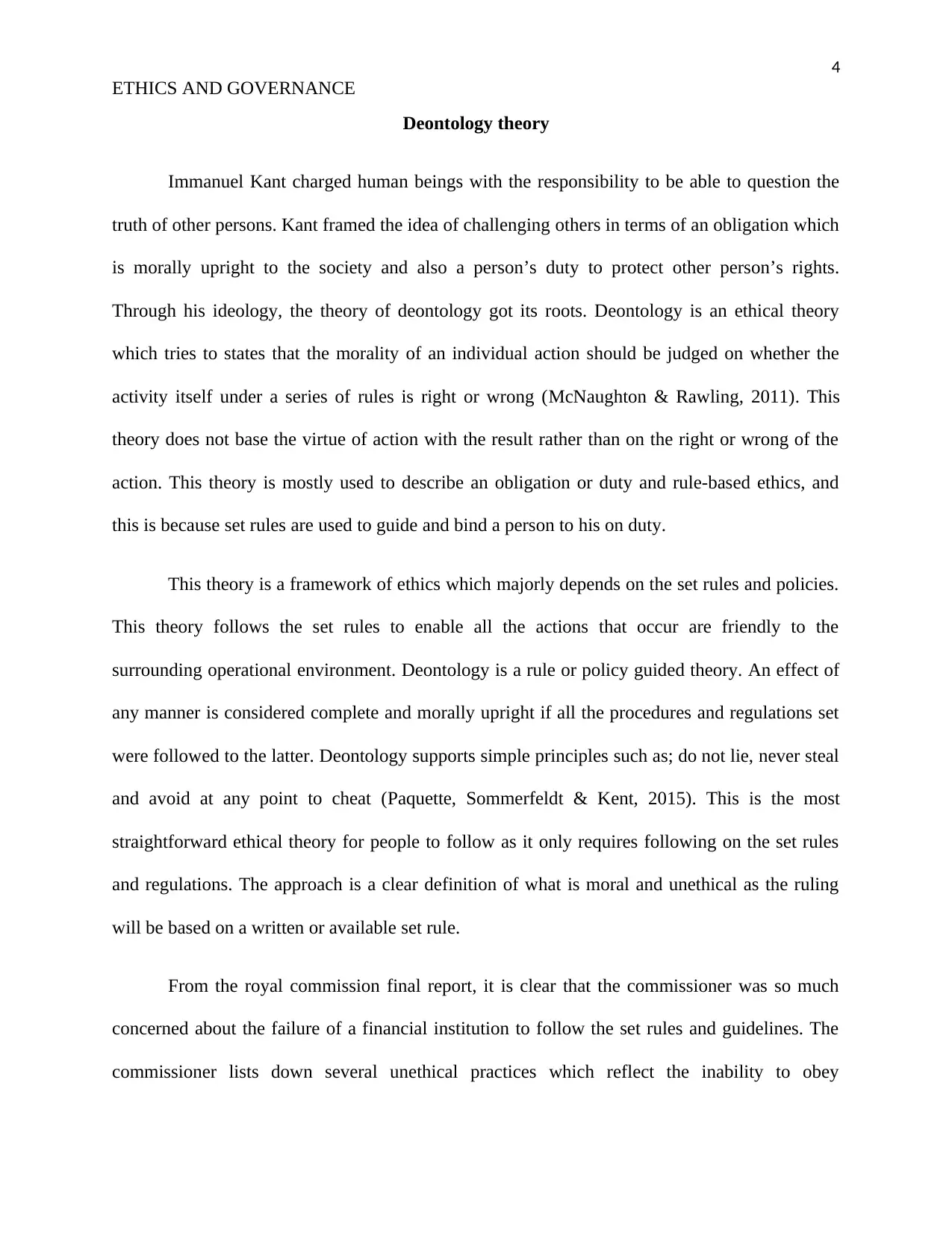
4
ETHICS AND GOVERNANCE
Deontology theory
Immanuel Kant charged human beings with the responsibility to be able to question the
truth of other persons. Kant framed the idea of challenging others in terms of an obligation which
is morally upright to the society and also a person’s duty to protect other person’s rights.
Through his ideology, the theory of deontology got its roots. Deontology is an ethical theory
which tries to states that the morality of an individual action should be judged on whether the
activity itself under a series of rules is right or wrong (McNaughton & Rawling, 2011). This
theory does not base the virtue of action with the result rather than on the right or wrong of the
action. This theory is mostly used to describe an obligation or duty and rule-based ethics, and
this is because set rules are used to guide and bind a person to his on duty.
This theory is a framework of ethics which majorly depends on the set rules and policies.
This theory follows the set rules to enable all the actions that occur are friendly to the
surrounding operational environment. Deontology is a rule or policy guided theory. An effect of
any manner is considered complete and morally upright if all the procedures and regulations set
were followed to the latter. Deontology supports simple principles such as; do not lie, never steal
and avoid at any point to cheat (Paquette, Sommerfeldt & Kent, 2015). This is the most
straightforward ethical theory for people to follow as it only requires following on the set rules
and regulations. The approach is a clear definition of what is moral and unethical as the ruling
will be based on a written or available set rule.
From the royal commission final report, it is clear that the commissioner was so much
concerned about the failure of a financial institution to follow the set rules and guidelines. The
commissioner lists down several unethical practices which reflect the inability to obey
ETHICS AND GOVERNANCE
Deontology theory
Immanuel Kant charged human beings with the responsibility to be able to question the
truth of other persons. Kant framed the idea of challenging others in terms of an obligation which
is morally upright to the society and also a person’s duty to protect other person’s rights.
Through his ideology, the theory of deontology got its roots. Deontology is an ethical theory
which tries to states that the morality of an individual action should be judged on whether the
activity itself under a series of rules is right or wrong (McNaughton & Rawling, 2011). This
theory does not base the virtue of action with the result rather than on the right or wrong of the
action. This theory is mostly used to describe an obligation or duty and rule-based ethics, and
this is because set rules are used to guide and bind a person to his on duty.
This theory is a framework of ethics which majorly depends on the set rules and policies.
This theory follows the set rules to enable all the actions that occur are friendly to the
surrounding operational environment. Deontology is a rule or policy guided theory. An effect of
any manner is considered complete and morally upright if all the procedures and regulations set
were followed to the latter. Deontology supports simple principles such as; do not lie, never steal
and avoid at any point to cheat (Paquette, Sommerfeldt & Kent, 2015). This is the most
straightforward ethical theory for people to follow as it only requires following on the set rules
and regulations. The approach is a clear definition of what is moral and unethical as the ruling
will be based on a written or available set rule.
From the royal commission final report, it is clear that the commissioner was so much
concerned about the failure of a financial institution to follow the set rules and guidelines. The
commissioner lists down several unethical practices which reflect the inability to obey
Paraphrase This Document
Need a fresh take? Get an instant paraphrase of this document with our AI Paraphraser
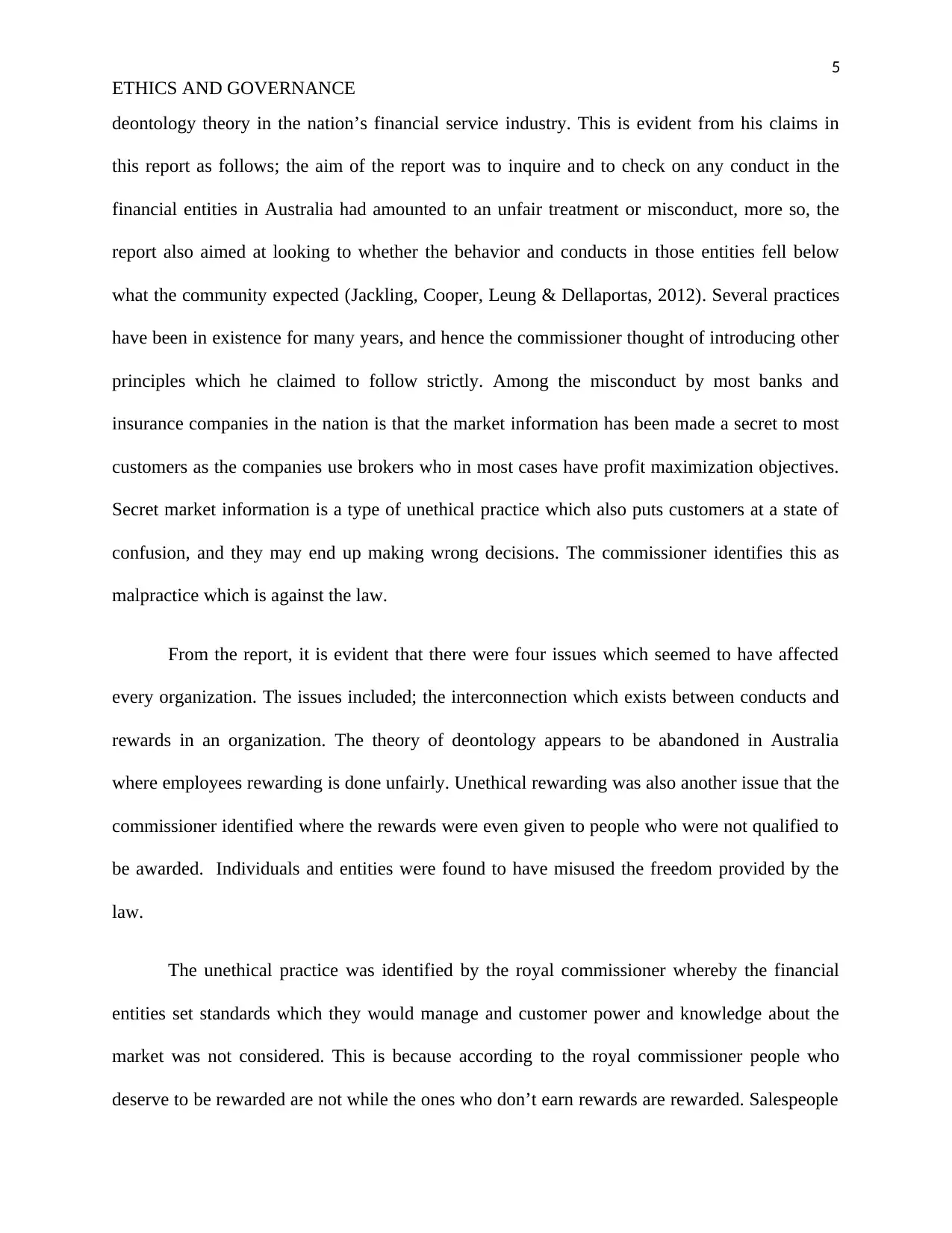
5
ETHICS AND GOVERNANCE
deontology theory in the nation’s financial service industry. This is evident from his claims in
this report as follows; the aim of the report was to inquire and to check on any conduct in the
financial entities in Australia had amounted to an unfair treatment or misconduct, more so, the
report also aimed at looking to whether the behavior and conducts in those entities fell below
what the community expected (Jackling, Cooper, Leung & Dellaportas, 2012). Several practices
have been in existence for many years, and hence the commissioner thought of introducing other
principles which he claimed to follow strictly. Among the misconduct by most banks and
insurance companies in the nation is that the market information has been made a secret to most
customers as the companies use brokers who in most cases have profit maximization objectives.
Secret market information is a type of unethical practice which also puts customers at a state of
confusion, and they may end up making wrong decisions. The commissioner identifies this as
malpractice which is against the law.
From the report, it is evident that there were four issues which seemed to have affected
every organization. The issues included; the interconnection which exists between conducts and
rewards in an organization. The theory of deontology appears to be abandoned in Australia
where employees rewarding is done unfairly. Unethical rewarding was also another issue that the
commissioner identified where the rewards were even given to people who were not qualified to
be awarded. Individuals and entities were found to have misused the freedom provided by the
law.
The unethical practice was identified by the royal commissioner whereby the financial
entities set standards which they would manage and customer power and knowledge about the
market was not considered. This is because according to the royal commissioner people who
deserve to be rewarded are not while the ones who don’t earn rewards are rewarded. Salespeople
ETHICS AND GOVERNANCE
deontology theory in the nation’s financial service industry. This is evident from his claims in
this report as follows; the aim of the report was to inquire and to check on any conduct in the
financial entities in Australia had amounted to an unfair treatment or misconduct, more so, the
report also aimed at looking to whether the behavior and conducts in those entities fell below
what the community expected (Jackling, Cooper, Leung & Dellaportas, 2012). Several practices
have been in existence for many years, and hence the commissioner thought of introducing other
principles which he claimed to follow strictly. Among the misconduct by most banks and
insurance companies in the nation is that the market information has been made a secret to most
customers as the companies use brokers who in most cases have profit maximization objectives.
Secret market information is a type of unethical practice which also puts customers at a state of
confusion, and they may end up making wrong decisions. The commissioner identifies this as
malpractice which is against the law.
From the report, it is evident that there were four issues which seemed to have affected
every organization. The issues included; the interconnection which exists between conducts and
rewards in an organization. The theory of deontology appears to be abandoned in Australia
where employees rewarding is done unfairly. Unethical rewarding was also another issue that the
commissioner identified where the rewards were even given to people who were not qualified to
be awarded. Individuals and entities were found to have misused the freedom provided by the
law.
The unethical practice was identified by the royal commissioner whereby the financial
entities set standards which they would manage and customer power and knowledge about the
market was not considered. This is because according to the royal commissioner people who
deserve to be rewarded are not while the ones who don’t earn rewards are rewarded. Salespeople
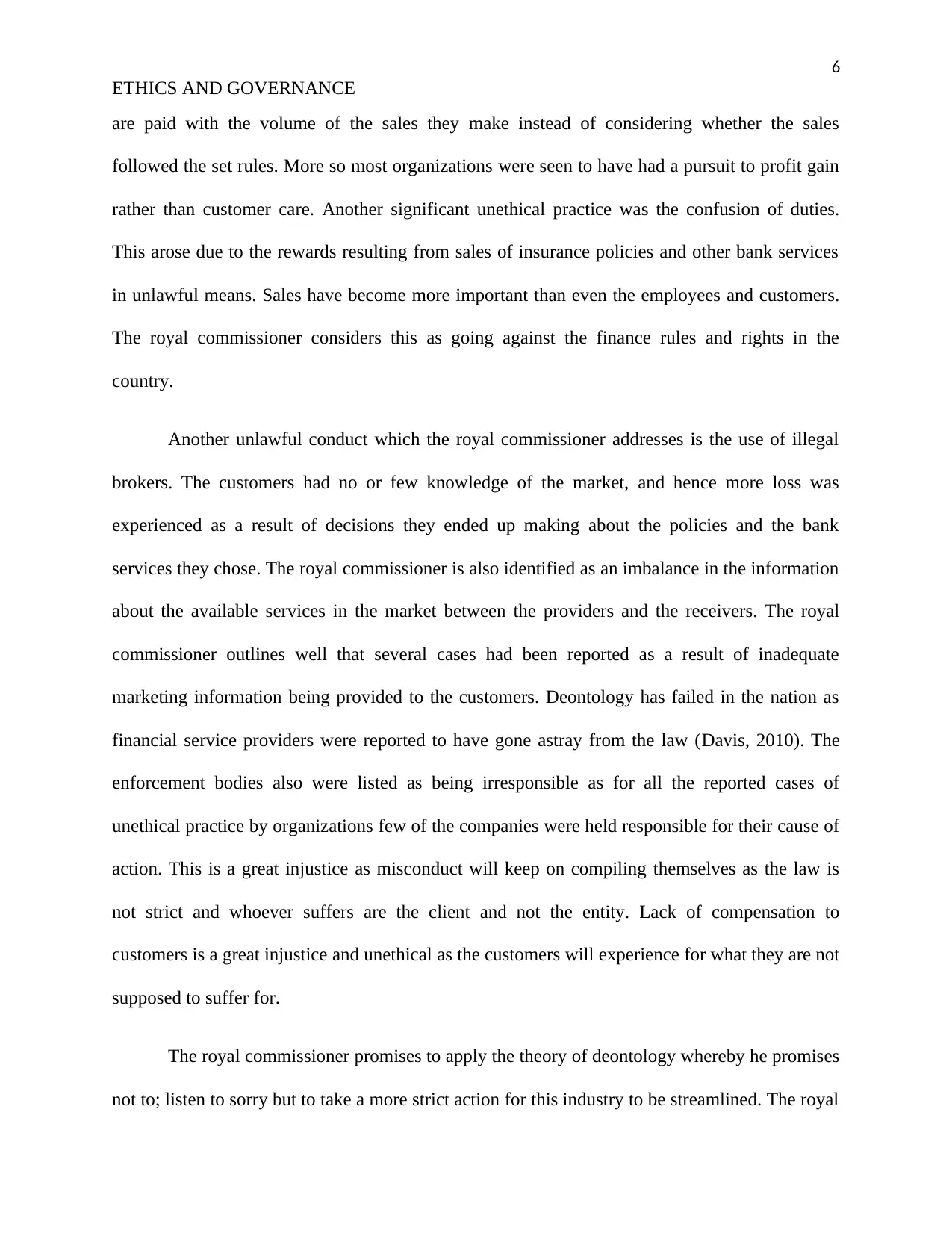
6
ETHICS AND GOVERNANCE
are paid with the volume of the sales they make instead of considering whether the sales
followed the set rules. More so most organizations were seen to have had a pursuit to profit gain
rather than customer care. Another significant unethical practice was the confusion of duties.
This arose due to the rewards resulting from sales of insurance policies and other bank services
in unlawful means. Sales have become more important than even the employees and customers.
The royal commissioner considers this as going against the finance rules and rights in the
country.
Another unlawful conduct which the royal commissioner addresses is the use of illegal
brokers. The customers had no or few knowledge of the market, and hence more loss was
experienced as a result of decisions they ended up making about the policies and the bank
services they chose. The royal commissioner is also identified as an imbalance in the information
about the available services in the market between the providers and the receivers. The royal
commissioner outlines well that several cases had been reported as a result of inadequate
marketing information being provided to the customers. Deontology has failed in the nation as
financial service providers were reported to have gone astray from the law (Davis, 2010). The
enforcement bodies also were listed as being irresponsible as for all the reported cases of
unethical practice by organizations few of the companies were held responsible for their cause of
action. This is a great injustice as misconduct will keep on compiling themselves as the law is
not strict and whoever suffers are the client and not the entity. Lack of compensation to
customers is a great injustice and unethical as the customers will experience for what they are not
supposed to suffer for.
The royal commissioner promises to apply the theory of deontology whereby he promises
not to; listen to sorry but to take a more strict action for this industry to be streamlined. The royal
ETHICS AND GOVERNANCE
are paid with the volume of the sales they make instead of considering whether the sales
followed the set rules. More so most organizations were seen to have had a pursuit to profit gain
rather than customer care. Another significant unethical practice was the confusion of duties.
This arose due to the rewards resulting from sales of insurance policies and other bank services
in unlawful means. Sales have become more important than even the employees and customers.
The royal commissioner considers this as going against the finance rules and rights in the
country.
Another unlawful conduct which the royal commissioner addresses is the use of illegal
brokers. The customers had no or few knowledge of the market, and hence more loss was
experienced as a result of decisions they ended up making about the policies and the bank
services they chose. The royal commissioner is also identified as an imbalance in the information
about the available services in the market between the providers and the receivers. The royal
commissioner outlines well that several cases had been reported as a result of inadequate
marketing information being provided to the customers. Deontology has failed in the nation as
financial service providers were reported to have gone astray from the law (Davis, 2010). The
enforcement bodies also were listed as being irresponsible as for all the reported cases of
unethical practice by organizations few of the companies were held responsible for their cause of
action. This is a great injustice as misconduct will keep on compiling themselves as the law is
not strict and whoever suffers are the client and not the entity. Lack of compensation to
customers is a great injustice and unethical as the customers will experience for what they are not
supposed to suffer for.
The royal commissioner promises to apply the theory of deontology whereby he promises
not to; listen to sorry but to take a more strict action for this industry to be streamlined. The royal
⊘ This is a preview!⊘
Do you want full access?
Subscribe today to unlock all pages.

Trusted by 1+ million students worldwide
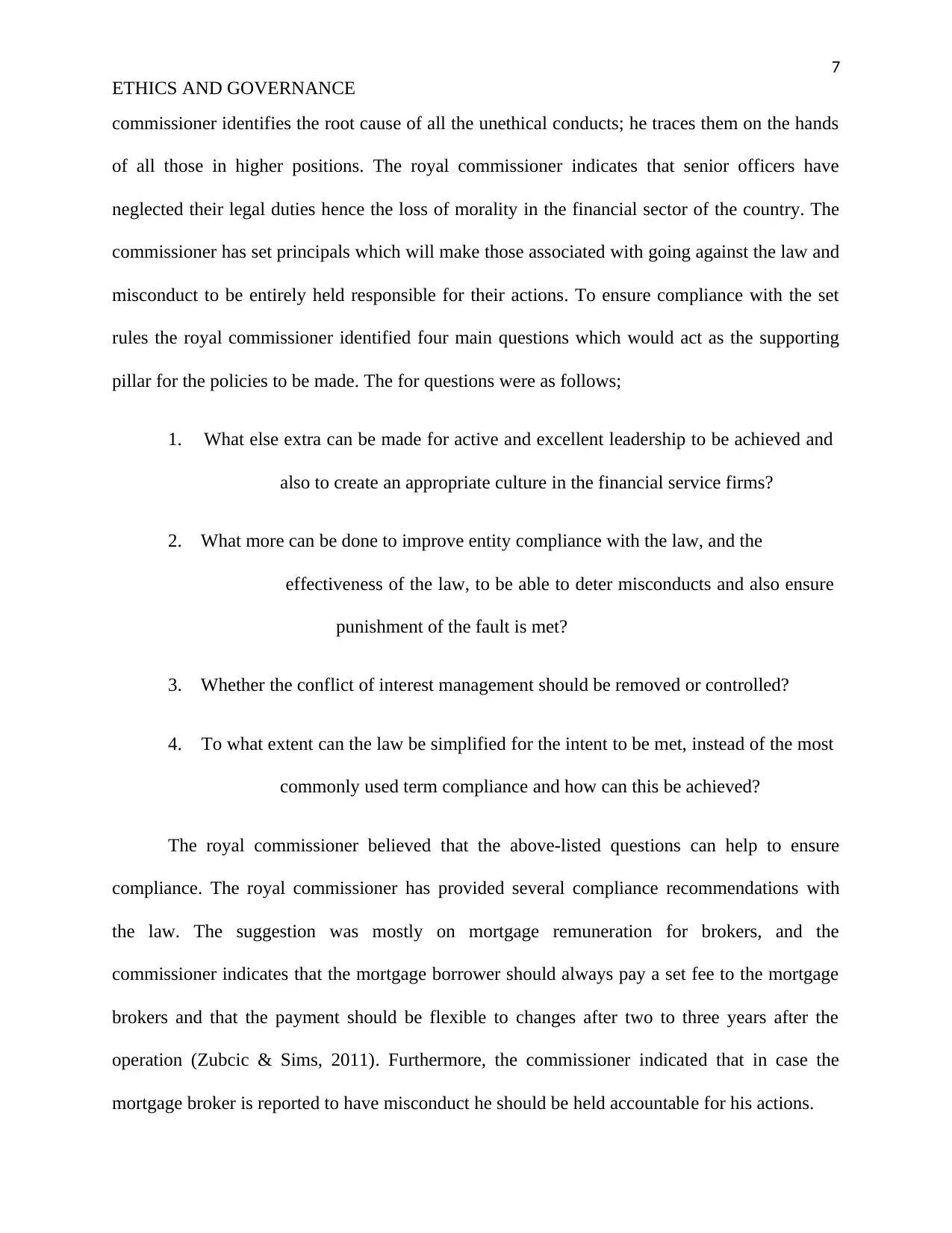
7
ETHICS AND GOVERNANCE
commissioner identifies the root cause of all the unethical conducts; he traces them on the hands
of all those in higher positions. The royal commissioner indicates that senior officers have
neglected their legal duties hence the loss of morality in the financial sector of the country. The
commissioner has set principals which will make those associated with going against the law and
misconduct to be entirely held responsible for their actions. To ensure compliance with the set
rules the royal commissioner identified four main questions which would act as the supporting
pillar for the policies to be made. The for questions were as follows;
1. What else extra can be made for active and excellent leadership to be achieved and
also to create an appropriate culture in the financial service firms?
2. What more can be done to improve entity compliance with the law, and the
effectiveness of the law, to be able to deter misconducts and also ensure
punishment of the fault is met?
3. Whether the conflict of interest management should be removed or controlled?
4. To what extent can the law be simplified for the intent to be met, instead of the most
commonly used term compliance and how can this be achieved?
The royal commissioner believed that the above-listed questions can help to ensure
compliance. The royal commissioner has provided several compliance recommendations with
the law. The suggestion was mostly on mortgage remuneration for brokers, and the
commissioner indicates that the mortgage borrower should always pay a set fee to the mortgage
brokers and that the payment should be flexible to changes after two to three years after the
operation (Zubcic & Sims, 2011). Furthermore, the commissioner indicated that in case the
mortgage broker is reported to have misconduct he should be held accountable for his actions.
ETHICS AND GOVERNANCE
commissioner identifies the root cause of all the unethical conducts; he traces them on the hands
of all those in higher positions. The royal commissioner indicates that senior officers have
neglected their legal duties hence the loss of morality in the financial sector of the country. The
commissioner has set principals which will make those associated with going against the law and
misconduct to be entirely held responsible for their actions. To ensure compliance with the set
rules the royal commissioner identified four main questions which would act as the supporting
pillar for the policies to be made. The for questions were as follows;
1. What else extra can be made for active and excellent leadership to be achieved and
also to create an appropriate culture in the financial service firms?
2. What more can be done to improve entity compliance with the law, and the
effectiveness of the law, to be able to deter misconducts and also ensure
punishment of the fault is met?
3. Whether the conflict of interest management should be removed or controlled?
4. To what extent can the law be simplified for the intent to be met, instead of the most
commonly used term compliance and how can this be achieved?
The royal commissioner believed that the above-listed questions can help to ensure
compliance. The royal commissioner has provided several compliance recommendations with
the law. The suggestion was mostly on mortgage remuneration for brokers, and the
commissioner indicates that the mortgage borrower should always pay a set fee to the mortgage
brokers and that the payment should be flexible to changes after two to three years after the
operation (Zubcic & Sims, 2011). Furthermore, the commissioner indicated that in case the
mortgage broker is reported to have misconduct he should be held accountable for his actions.
Paraphrase This Document
Need a fresh take? Get an instant paraphrase of this document with our AI Paraphraser
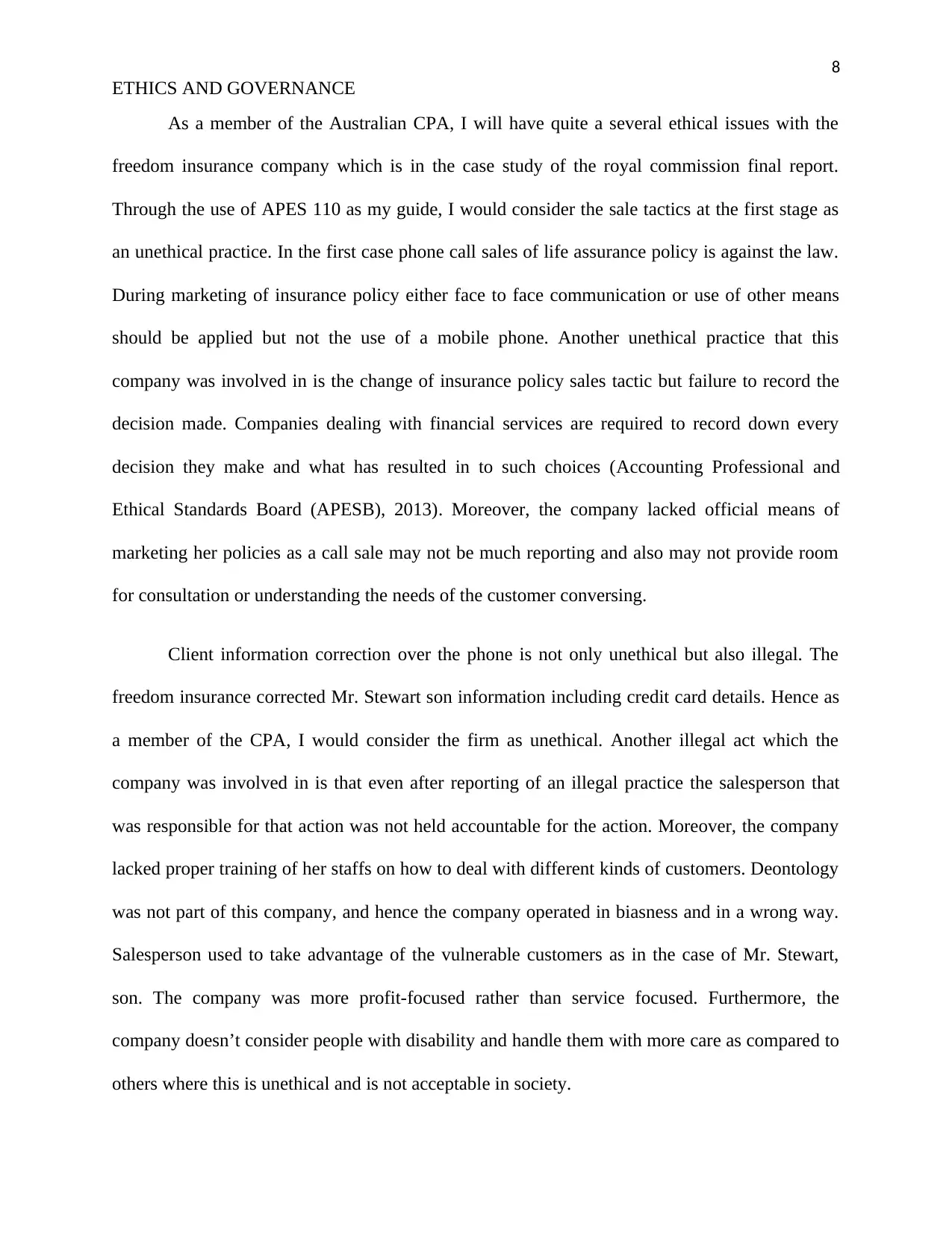
8
ETHICS AND GOVERNANCE
As a member of the Australian CPA, I will have quite a several ethical issues with the
freedom insurance company which is in the case study of the royal commission final report.
Through the use of APES 110 as my guide, I would consider the sale tactics at the first stage as
an unethical practice. In the first case phone call sales of life assurance policy is against the law.
During marketing of insurance policy either face to face communication or use of other means
should be applied but not the use of a mobile phone. Another unethical practice that this
company was involved in is the change of insurance policy sales tactic but failure to record the
decision made. Companies dealing with financial services are required to record down every
decision they make and what has resulted in to such choices (Accounting Professional and
Ethical Standards Board (APESB), 2013). Moreover, the company lacked official means of
marketing her policies as a call sale may not be much reporting and also may not provide room
for consultation or understanding the needs of the customer conversing.
Client information correction over the phone is not only unethical but also illegal. The
freedom insurance corrected Mr. Stewart son information including credit card details. Hence as
a member of the CPA, I would consider the firm as unethical. Another illegal act which the
company was involved in is that even after reporting of an illegal practice the salesperson that
was responsible for that action was not held accountable for the action. Moreover, the company
lacked proper training of her staffs on how to deal with different kinds of customers. Deontology
was not part of this company, and hence the company operated in biasness and in a wrong way.
Salesperson used to take advantage of the vulnerable customers as in the case of Mr. Stewart,
son. The company was more profit-focused rather than service focused. Furthermore, the
company doesn’t consider people with disability and handle them with more care as compared to
others where this is unethical and is not acceptable in society.
ETHICS AND GOVERNANCE
As a member of the Australian CPA, I will have quite a several ethical issues with the
freedom insurance company which is in the case study of the royal commission final report.
Through the use of APES 110 as my guide, I would consider the sale tactics at the first stage as
an unethical practice. In the first case phone call sales of life assurance policy is against the law.
During marketing of insurance policy either face to face communication or use of other means
should be applied but not the use of a mobile phone. Another unethical practice that this
company was involved in is the change of insurance policy sales tactic but failure to record the
decision made. Companies dealing with financial services are required to record down every
decision they make and what has resulted in to such choices (Accounting Professional and
Ethical Standards Board (APESB), 2013). Moreover, the company lacked official means of
marketing her policies as a call sale may not be much reporting and also may not provide room
for consultation or understanding the needs of the customer conversing.
Client information correction over the phone is not only unethical but also illegal. The
freedom insurance corrected Mr. Stewart son information including credit card details. Hence as
a member of the CPA, I would consider the firm as unethical. Another illegal act which the
company was involved in is that even after reporting of an illegal practice the salesperson that
was responsible for that action was not held accountable for the action. Moreover, the company
lacked proper training of her staffs on how to deal with different kinds of customers. Deontology
was not part of this company, and hence the company operated in biasness and in a wrong way.
Salesperson used to take advantage of the vulnerable customers as in the case of Mr. Stewart,
son. The company was more profit-focused rather than service focused. Furthermore, the
company doesn’t consider people with disability and handle them with more care as compared to
others where this is unethical and is not acceptable in society.
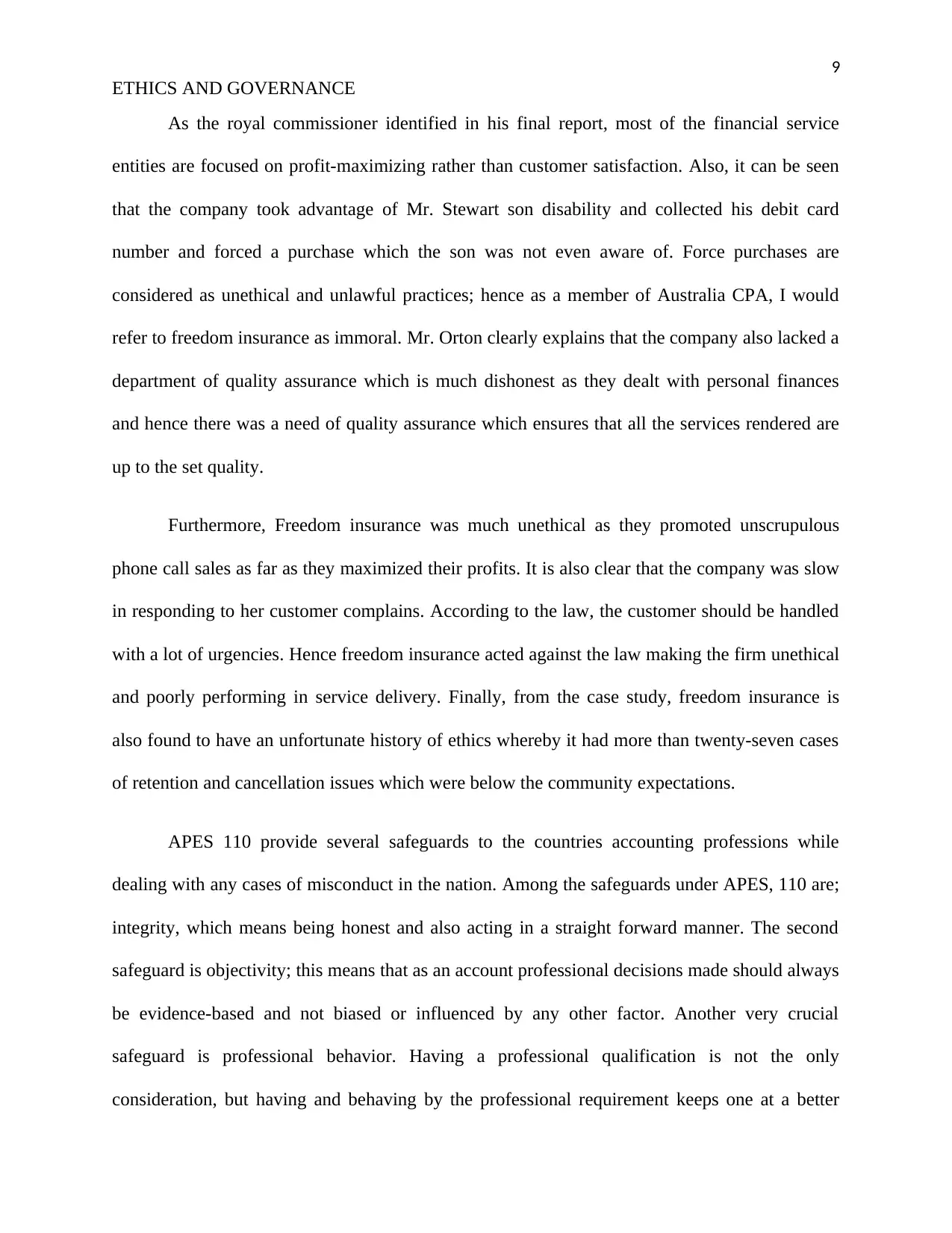
9
ETHICS AND GOVERNANCE
As the royal commissioner identified in his final report, most of the financial service
entities are focused on profit-maximizing rather than customer satisfaction. Also, it can be seen
that the company took advantage of Mr. Stewart son disability and collected his debit card
number and forced a purchase which the son was not even aware of. Force purchases are
considered as unethical and unlawful practices; hence as a member of Australia CPA, I would
refer to freedom insurance as immoral. Mr. Orton clearly explains that the company also lacked a
department of quality assurance which is much dishonest as they dealt with personal finances
and hence there was a need of quality assurance which ensures that all the services rendered are
up to the set quality.
Furthermore, Freedom insurance was much unethical as they promoted unscrupulous
phone call sales as far as they maximized their profits. It is also clear that the company was slow
in responding to her customer complains. According to the law, the customer should be handled
with a lot of urgencies. Hence freedom insurance acted against the law making the firm unethical
and poorly performing in service delivery. Finally, from the case study, freedom insurance is
also found to have an unfortunate history of ethics whereby it had more than twenty-seven cases
of retention and cancellation issues which were below the community expectations.
APES 110 provide several safeguards to the countries accounting professions while
dealing with any cases of misconduct in the nation. Among the safeguards under APES, 110 are;
integrity, which means being honest and also acting in a straight forward manner. The second
safeguard is objectivity; this means that as an account professional decisions made should always
be evidence-based and not biased or influenced by any other factor. Another very crucial
safeguard is professional behavior. Having a professional qualification is not the only
consideration, but having and behaving by the professional requirement keeps one at a better
ETHICS AND GOVERNANCE
As the royal commissioner identified in his final report, most of the financial service
entities are focused on profit-maximizing rather than customer satisfaction. Also, it can be seen
that the company took advantage of Mr. Stewart son disability and collected his debit card
number and forced a purchase which the son was not even aware of. Force purchases are
considered as unethical and unlawful practices; hence as a member of Australia CPA, I would
refer to freedom insurance as immoral. Mr. Orton clearly explains that the company also lacked a
department of quality assurance which is much dishonest as they dealt with personal finances
and hence there was a need of quality assurance which ensures that all the services rendered are
up to the set quality.
Furthermore, Freedom insurance was much unethical as they promoted unscrupulous
phone call sales as far as they maximized their profits. It is also clear that the company was slow
in responding to her customer complains. According to the law, the customer should be handled
with a lot of urgencies. Hence freedom insurance acted against the law making the firm unethical
and poorly performing in service delivery. Finally, from the case study, freedom insurance is
also found to have an unfortunate history of ethics whereby it had more than twenty-seven cases
of retention and cancellation issues which were below the community expectations.
APES 110 provide several safeguards to the countries accounting professions while
dealing with any cases of misconduct in the nation. Among the safeguards under APES, 110 are;
integrity, which means being honest and also acting in a straight forward manner. The second
safeguard is objectivity; this means that as an account professional decisions made should always
be evidence-based and not biased or influenced by any other factor. Another very crucial
safeguard is professional behavior. Having a professional qualification is not the only
consideration, but having and behaving by the professional requirement keeps one at a better
⊘ This is a preview!⊘
Do you want full access?
Subscribe today to unlock all pages.

Trusted by 1+ million students worldwide
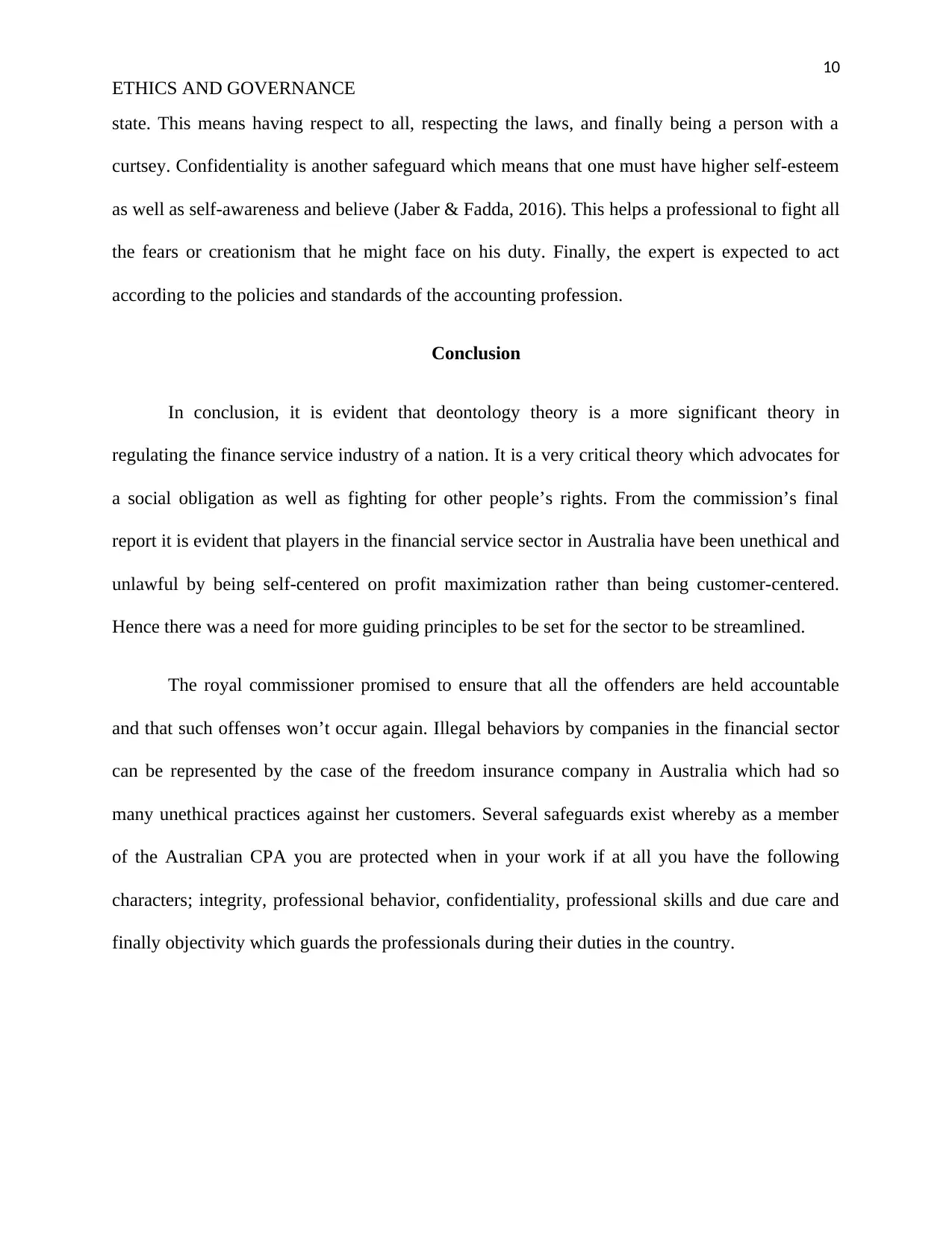
10
ETHICS AND GOVERNANCE
state. This means having respect to all, respecting the laws, and finally being a person with a
curtsey. Confidentiality is another safeguard which means that one must have higher self-esteem
as well as self-awareness and believe (Jaber & Fadda, 2016). This helps a professional to fight all
the fears or creationism that he might face on his duty. Finally, the expert is expected to act
according to the policies and standards of the accounting profession.
Conclusion
In conclusion, it is evident that deontology theory is a more significant theory in
regulating the finance service industry of a nation. It is a very critical theory which advocates for
a social obligation as well as fighting for other people’s rights. From the commission’s final
report it is evident that players in the financial service sector in Australia have been unethical and
unlawful by being self-centered on profit maximization rather than being customer-centered.
Hence there was a need for more guiding principles to be set for the sector to be streamlined.
The royal commissioner promised to ensure that all the offenders are held accountable
and that such offenses won’t occur again. Illegal behaviors by companies in the financial sector
can be represented by the case of the freedom insurance company in Australia which had so
many unethical practices against her customers. Several safeguards exist whereby as a member
of the Australian CPA you are protected when in your work if at all you have the following
characters; integrity, professional behavior, confidentiality, professional skills and due care and
finally objectivity which guards the professionals during their duties in the country.
ETHICS AND GOVERNANCE
state. This means having respect to all, respecting the laws, and finally being a person with a
curtsey. Confidentiality is another safeguard which means that one must have higher self-esteem
as well as self-awareness and believe (Jaber & Fadda, 2016). This helps a professional to fight all
the fears or creationism that he might face on his duty. Finally, the expert is expected to act
according to the policies and standards of the accounting profession.
Conclusion
In conclusion, it is evident that deontology theory is a more significant theory in
regulating the finance service industry of a nation. It is a very critical theory which advocates for
a social obligation as well as fighting for other people’s rights. From the commission’s final
report it is evident that players in the financial service sector in Australia have been unethical and
unlawful by being self-centered on profit maximization rather than being customer-centered.
Hence there was a need for more guiding principles to be set for the sector to be streamlined.
The royal commissioner promised to ensure that all the offenders are held accountable
and that such offenses won’t occur again. Illegal behaviors by companies in the financial sector
can be represented by the case of the freedom insurance company in Australia which had so
many unethical practices against her customers. Several safeguards exist whereby as a member
of the Australian CPA you are protected when in your work if at all you have the following
characters; integrity, professional behavior, confidentiality, professional skills and due care and
finally objectivity which guards the professionals during their duties in the country.
Paraphrase This Document
Need a fresh take? Get an instant paraphrase of this document with our AI Paraphraser
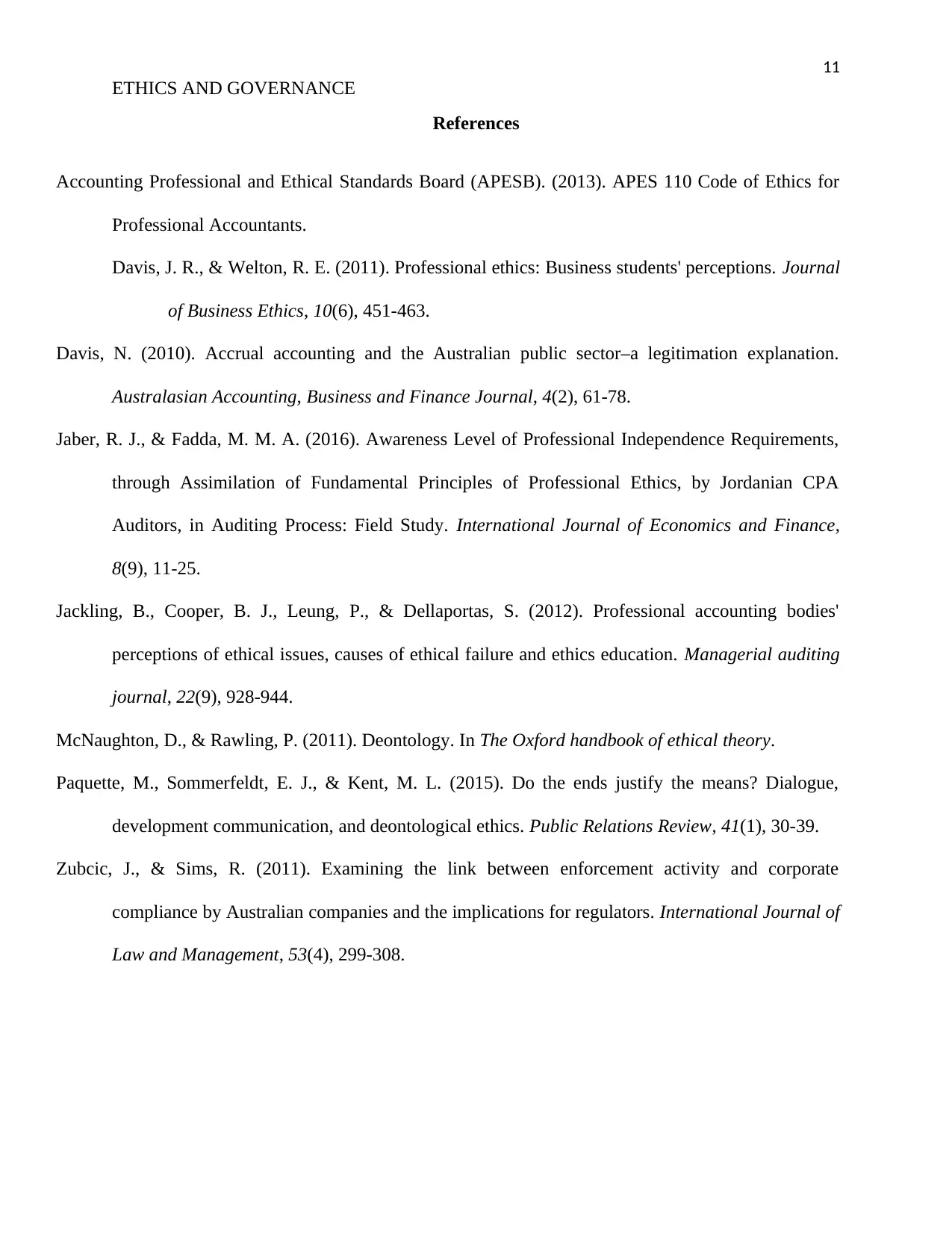
11
ETHICS AND GOVERNANCE
References
Accounting Professional and Ethical Standards Board (APESB). (2013). APES 110 Code of Ethics for
Professional Accountants.
Davis, J. R., & Welton, R. E. (2011). Professional ethics: Business students' perceptions. Journal
of Business Ethics, 10(6), 451-463.
Davis, N. (2010). Accrual accounting and the Australian public sector–a legitimation explanation.
Australasian Accounting, Business and Finance Journal, 4(2), 61-78.
Jaber, R. J., & Fadda, M. M. A. (2016). Awareness Level of Professional Independence Requirements,
through Assimilation of Fundamental Principles of Professional Ethics, by Jordanian CPA
Auditors, in Auditing Process: Field Study. International Journal of Economics and Finance,
8(9), 11-25.
Jackling, B., Cooper, B. J., Leung, P., & Dellaportas, S. (2012). Professional accounting bodies'
perceptions of ethical issues, causes of ethical failure and ethics education. Managerial auditing
journal, 22(9), 928-944.
McNaughton, D., & Rawling, P. (2011). Deontology. In The Oxford handbook of ethical theory.
Paquette, M., Sommerfeldt, E. J., & Kent, M. L. (2015). Do the ends justify the means? Dialogue,
development communication, and deontological ethics. Public Relations Review, 41(1), 30-39.
Zubcic, J., & Sims, R. (2011). Examining the link between enforcement activity and corporate
compliance by Australian companies and the implications for regulators. International Journal of
Law and Management, 53(4), 299-308.
ETHICS AND GOVERNANCE
References
Accounting Professional and Ethical Standards Board (APESB). (2013). APES 110 Code of Ethics for
Professional Accountants.
Davis, J. R., & Welton, R. E. (2011). Professional ethics: Business students' perceptions. Journal
of Business Ethics, 10(6), 451-463.
Davis, N. (2010). Accrual accounting and the Australian public sector–a legitimation explanation.
Australasian Accounting, Business and Finance Journal, 4(2), 61-78.
Jaber, R. J., & Fadda, M. M. A. (2016). Awareness Level of Professional Independence Requirements,
through Assimilation of Fundamental Principles of Professional Ethics, by Jordanian CPA
Auditors, in Auditing Process: Field Study. International Journal of Economics and Finance,
8(9), 11-25.
Jackling, B., Cooper, B. J., Leung, P., & Dellaportas, S. (2012). Professional accounting bodies'
perceptions of ethical issues, causes of ethical failure and ethics education. Managerial auditing
journal, 22(9), 928-944.
McNaughton, D., & Rawling, P. (2011). Deontology. In The Oxford handbook of ethical theory.
Paquette, M., Sommerfeldt, E. J., & Kent, M. L. (2015). Do the ends justify the means? Dialogue,
development communication, and deontological ethics. Public Relations Review, 41(1), 30-39.
Zubcic, J., & Sims, R. (2011). Examining the link between enforcement activity and corporate
compliance by Australian companies and the implications for regulators. International Journal of
Law and Management, 53(4), 299-308.
1 out of 11
Related Documents
Your All-in-One AI-Powered Toolkit for Academic Success.
+13062052269
info@desklib.com
Available 24*7 on WhatsApp / Email
![[object Object]](/_next/static/media/star-bottom.7253800d.svg)
Unlock your academic potential
Copyright © 2020–2025 A2Z Services. All Rights Reserved. Developed and managed by ZUCOL.





